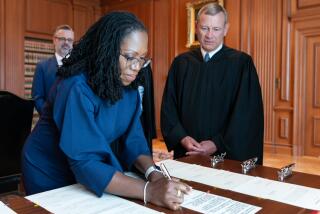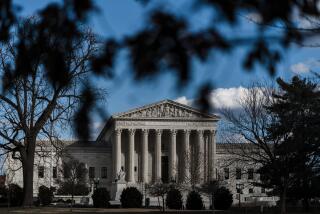Glossary
- Share via
Terms relevant to George W. Bush v. Palm Beach County Canvassing Board and Friday’s Supreme Court hearing on the case:
*
Article II--In the U.S. Constitution, it grants state legislators the authority to select presidential electors for their state. The Bush suit argues that the Florida Supreme Court stripped this power from the Florida Legislature.
*
Blacker--See McPherson vs. Blacker.
*
Due Process Clause--The due process clause of the 14th Amendment protects basic rights, including the right to vote. Bush’s attorneys assert that the Florida Supreme Court violated due process.
*
Federalism--The system of government, established by the Constitution, that gives independent powers to the central federal system and to the states. Al Gore’s lawyers contend that state law alone regulates elections.
*
Hayes-Tilden--Shorthand for the 1876 presidential race, in which Rutherford B. Hayes lost the popular vote to Samuel J. Tilden but still won the White House--by one electoral vote.
*
Judicial Review--This principle is not specifically mentioned in the Constitution, but was established in an 1803 case. It allows courts to review decisions from other branches of government. Parties in this case are debating whether the Florida Supreme Court went too far in interpreting Florida statutes.
*
Lindsey--In Lindsey vs. Washington, a 1937 case about criminal sentencing, the justices’ ruling gave federal, not state, courts the authority to determine whether state laws were changed retroactively. Bush attorneys, arguing that Florida illegally changed its election laws after election day, cite this decision in support of bringing this case to the federal court.
*
McPherson vs. Blacker--An 1892 case in which the justices upheld the Michigan Legislature’s decision to allocate electors by district rather than by statewide popular vote. Before Friday, this was the only case in which the high court has discussed the appointment of electors.
*
Oregon vs. Mitchell--In this 1970 case regarding the 1965 Voting Rights Act, the court split 5-4 in deciding that Congress could set the voting age in national elections but not in state contests. The larger issue was how much control the federal government could have over the administration of state elections. Soon after the court’s decision, Congress adopted the 26th Amend-ment, which lowered the voting age nationwide to 18.
*
Safe Harbor--Something, such as a statutory or regulatory provision, that provides protection, such as from a penalty or liability.
*
Scheme--A combination of elements, such as statutes or regulations, that are connected, adjusted, and integrated by design--a systematic plan or program.
*
Separation of Powers--The doctrine preventing the executive, legislative and judicial branches of government from infringing on each other’s authority.
*
Title 3, Section 5--This section of the United States Code states that election disputes must be settled in accordance with laws enacted prior to election day.
*
Sources: Black’s Law Dictionary, 4th revised ed.; The Oxford Companion to the Supreme Court of the United States; Merriam-Webster’s Dictionary of Law; Webster’s New World Dictionary, 3rd College ed.
*
Compiled by MASSIE RITSCH/Los Angeles Times
More to Read
Get the L.A. Times Politics newsletter
Deeply reported insights into legislation, politics and policy from Sacramento, Washington and beyond. In your inbox twice per week.
You may occasionally receive promotional content from the Los Angeles Times.










